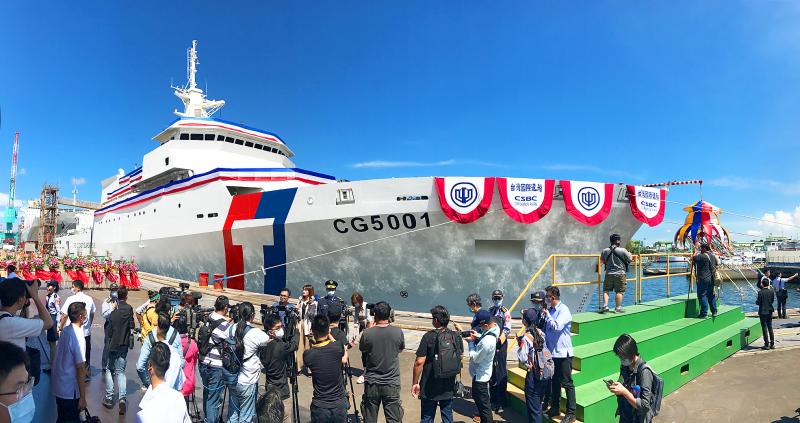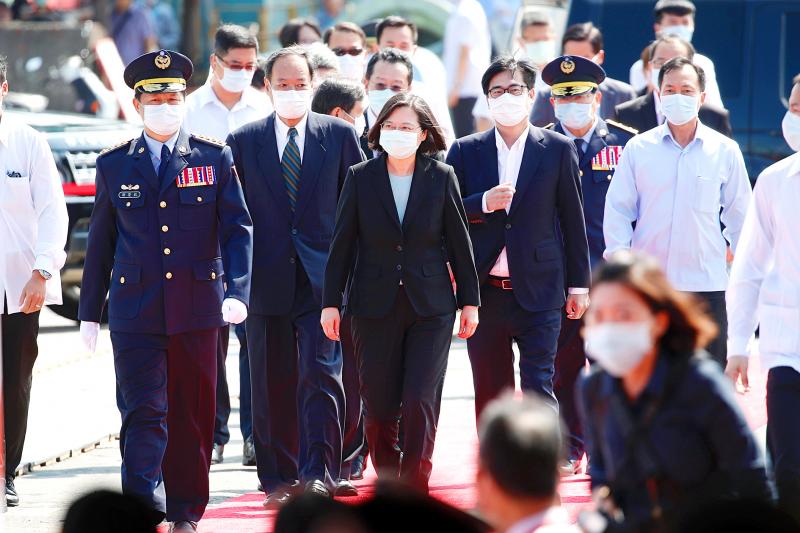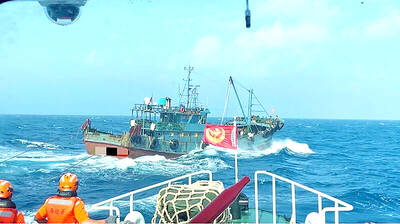President Tsai Ing-wen (蔡英文) yesterday touted the nation’s indigenous ship program as being successful as she presided over a ceremony in Kaohsiung for the launch of the first of the Coast Guard Administration’s (CGA) planned fleet of four 4,000-tonne frigates.
According to the Ocean Affairs Council, the ship was named Chiayi (嘉義) based on the council’s naming regulations for coast guard ships, adding that “Chiayi,” which catches more fish than any other county or city, was an apt name for the ship with the largest tonnage in the CGA.
Built by CSBC Corp, Taiwan (CSBC, 台灣國際造船), the ship has professional-grade medical facilities, as well as a negative-pressure isolation ward and a surgery room, to meet disease prevention regulations, the council said.

Photo: CNA
The council said that normal sick beds on the ship could also be fitted with negative pressure covers, to decrease chances of infection.
The ship is also capable of carrying one Sikorsky S-70C helicopter, which could ferry sick patients to medical establishments on land and would increase the ship’s patrol capabilities, it said.
Capable of withstanding level 10 winds and undertaking long missions of up to 10,000 nautical miles (18,520km), the Chiayi and the other three ships would be able to deliver disease prevention materials to nearby countries, and help with humanitarian aid, the council said.

Photo: EPA-EFE
The Chiayi is expected to be deployed under the CGA’s central Taiwan branch.
In her speech, Tsai said that the addition of the ship would increase mission efficacy and improve safety for CGA personnel.
The ship’s launch shows that the indigenous ship program is successful, that Taiwan is serious about bolstering its national defense capabilities and marks the beginning of a new era for the national defense industry, she said.
Tsai said that she wanted to thank all who have contributed to the program’s success and the CGA’s personnel, who oversee the defense of Taiwanese territorial waters.
The ship is the largest frigate in the nation’s existing fleet and is the result of successful collaboration with international company Ingalls Shipbuilding Co, which designed the Legend-class National Security Cutter being used by the US Coast Guard, Tsai said.
Although designed foremost as a support ship, the Chiayi could be quickly refitted with armaments if war should break out across the Taiwan Strait, the president added.

POLITICAL AGENDA: Beijing’s cross-strait Mid-Autumn Festival events are part of a ‘cultural united front’ aimed at promoting unification with Taiwan, academics said Local authorities in China have been inviting Taiwanese to participate in cross-strait Mid-Autumn Festival celebrations centered around ideals of “family and nation,” a move Taiwanese academics said politicizes the holiday to promote the idea of “one family” across the Taiwan Strait. Sources said that China’s Fujian Provincial Government is organizing about 20 cross-strait-themed events in cities including Quanzhou, Nanping, Sanming and Zhangzhou. In Zhangzhou, a festival scheduled for Wednesday is to showcase Minnan-language songs and budaixi (布袋戲) glove puppetry to highlight cultural similarities between Taiwan and the region. Elsewhere, Jiangsu Province is hosting more than 10 similar celebrations in Taizhou, Changzhou, Suzhou,

COGNITIVE WARFARE: Chinese fishing boats transmitting fake identification signals are meant to test Taiwan’s responses to different kinds of perceived incursions, a report said Chinese vessels are transmitting fake signals in Taiwan’s waters as a form of cognitive warfare, testing Taipei’s responses to various types of incursions, a report by the Institute for the Study of War said on Friday. Several Chinese fishing vessels transmitted fake automatic identification system (AIS) signals in Taiwan’s waters last month, with one mimicking a Russian warship and another impersonating a Chinese law enforcement vessel, the report said. Citing data from Starboard Maritime Intelligence, the report said that throughout August and last month, the Chinese fishing boat Minshiyu 06718 (閩獅漁06718) sailed through the Taiwan Strait while intermittently transmitting its own AIS

The Republic of China (ROC) is celebrating its 114th Double Ten National Day today, featuring military parades and a variety of performances and speeches in front of the Presidential Office in Taipei. The Taiwan Taiko Association opened the celebrations with a 100-drummer performance, including young percussionists. As per tradition, an air force Mirage 2000 fighter jet flew over the Presidential Office as a part of the performance. The Honor Guards of the ROC and its marching band also heralded in a military parade. Students from Taichung's Shin Min High School then followed with a colorful performance using floral imagery to represent Taiwan's alternate name

CHINESE INFILTRATION: Medical logistics is a lifeline during wartime and the reported CCP links of a major logistics company present a national security threat, an expert said The government would bolster its security check system to prevent China from infiltrating the nation’s medical cold chain, a national security official said yesterday. The official, who wished to stay anonymous, made the remarks after the Chinese-language magazine Mirror Media (鏡周刊) reported that Pharma Logistics (嘉里醫藥物流) is in charge of the medical logistics of about half of the nation’s major hospitals, including National Taiwan University Hospital and Taipei Veterans General Hospital. The company’s parent, Kerry TJ Logistics Co (嘉里大榮物流), is associated with the National Committee of the Chinese People’s Political Consultative Conference (CPPCC) and the Chinese People’s Liberation Army (PLA), the